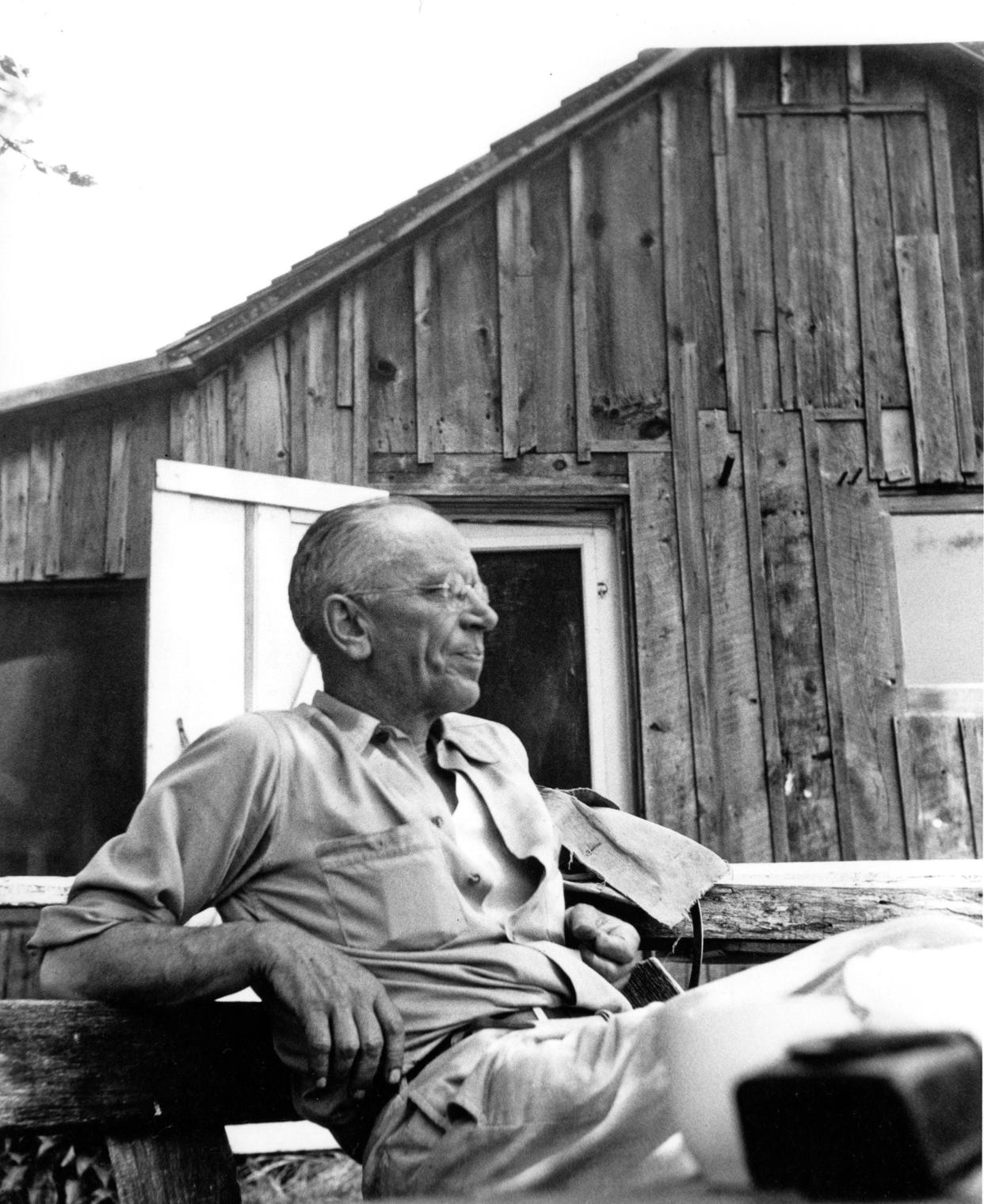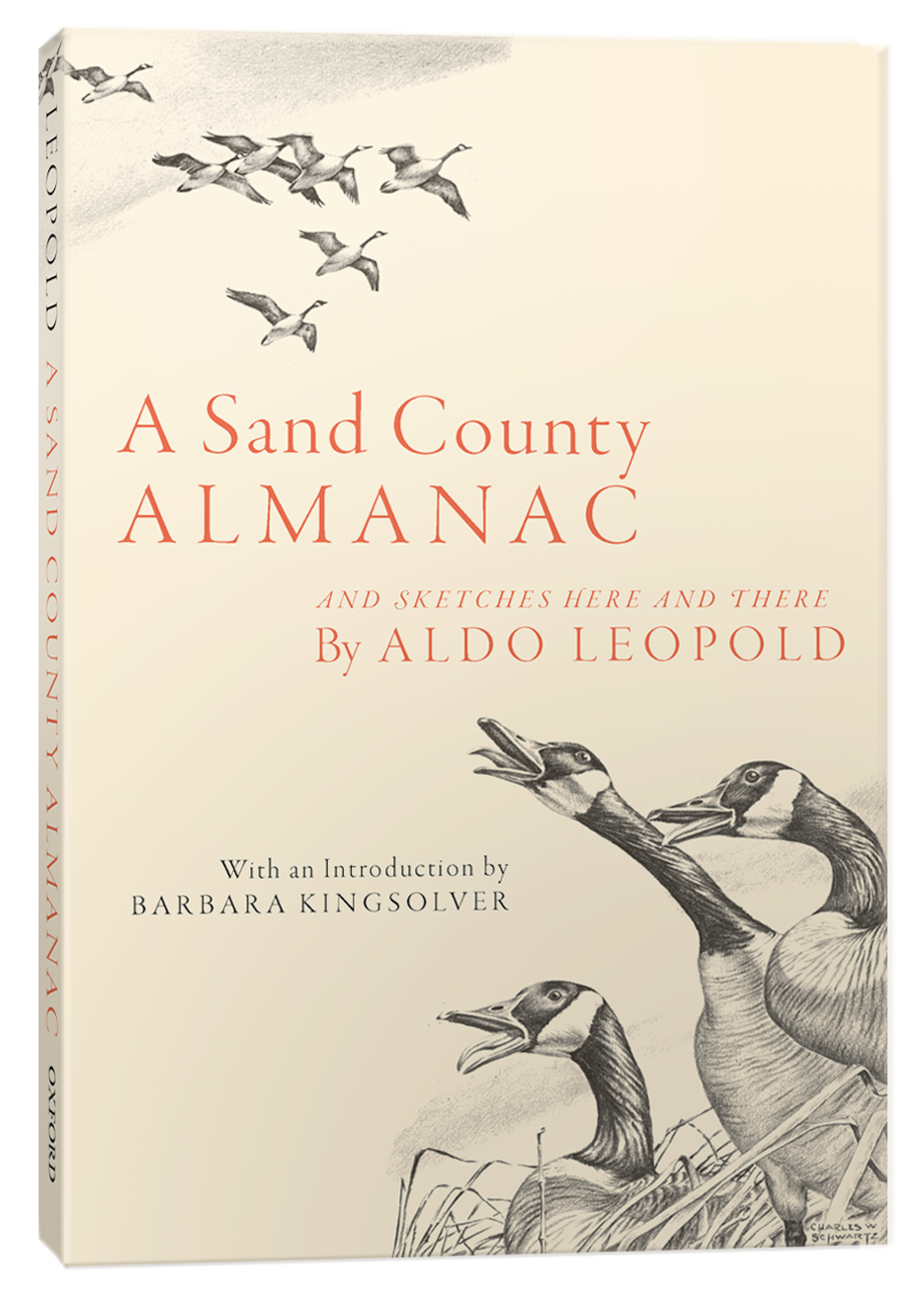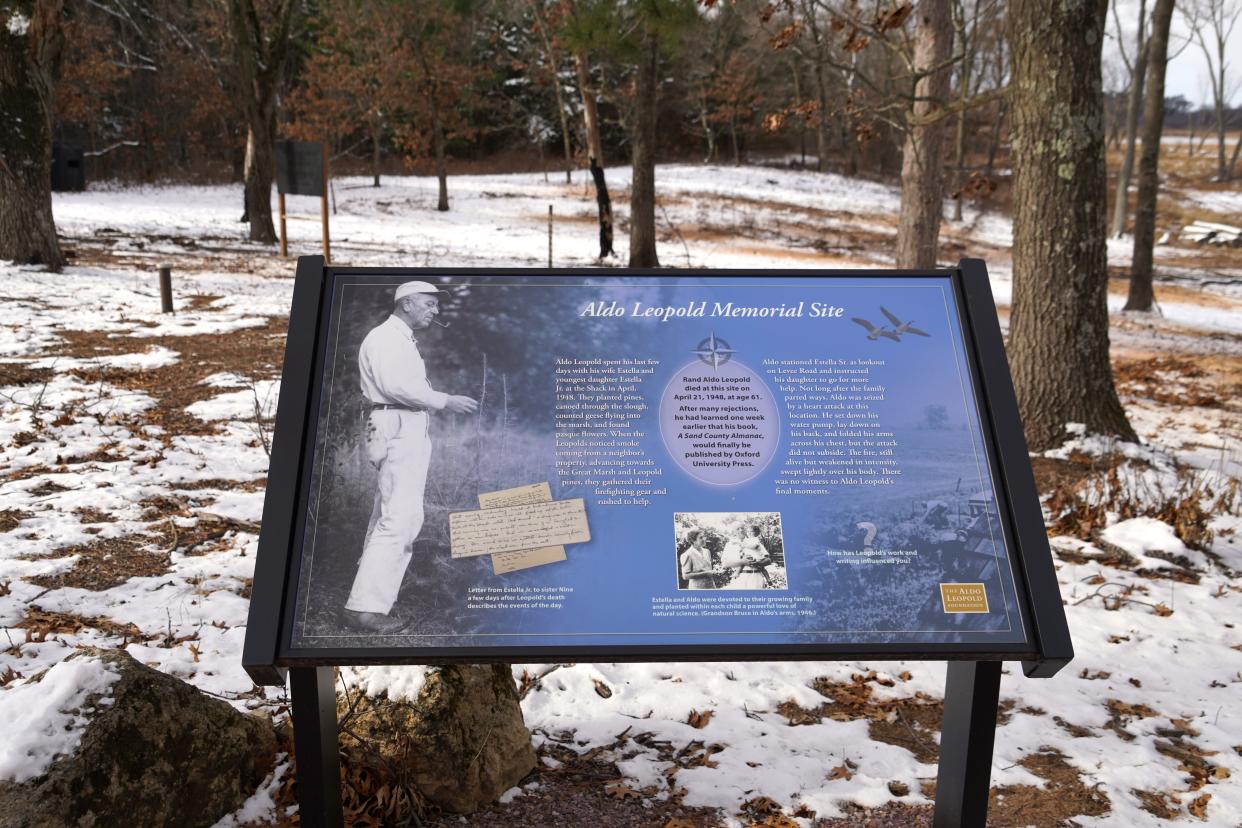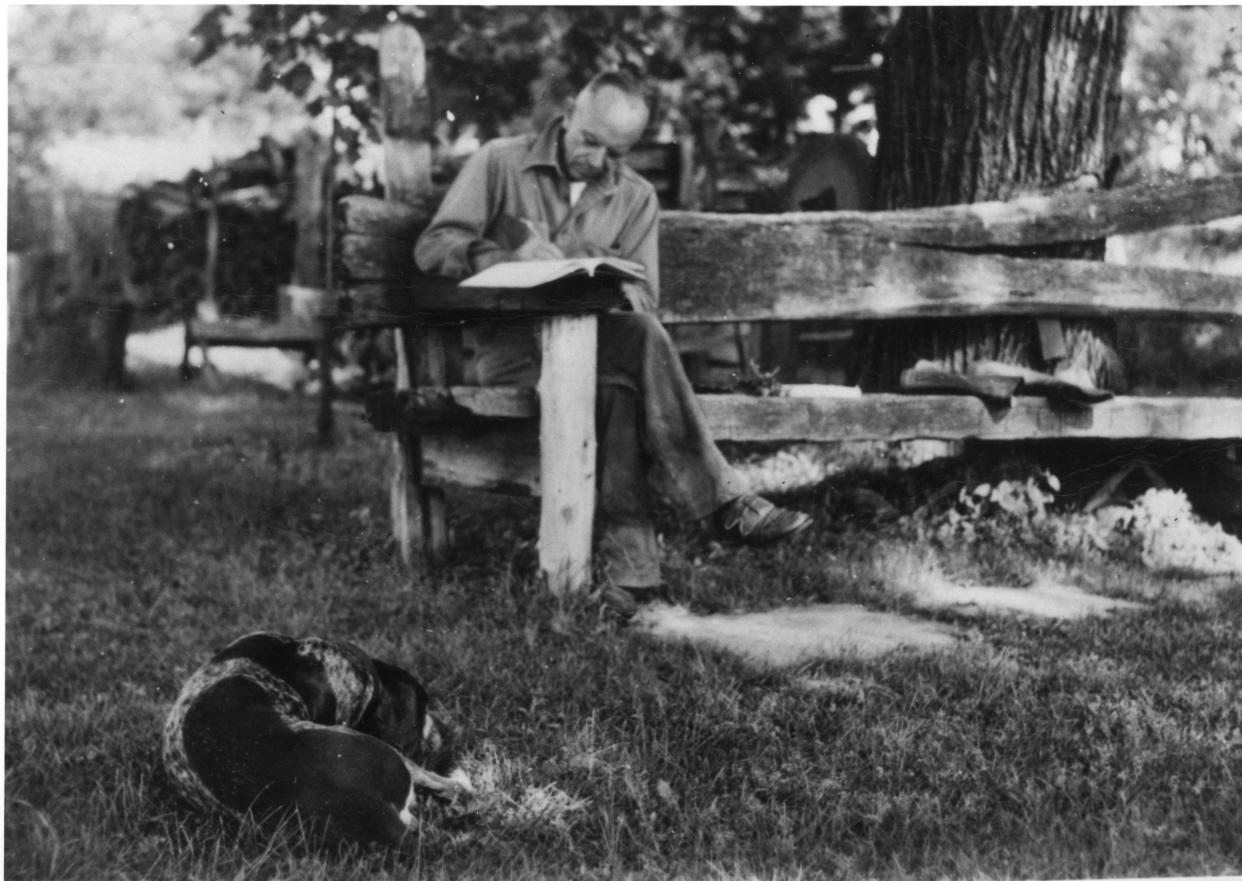Smith: On its 75th anniversary, lessons of "A Sand County Almanac" more relevant than ever

BARABOO - Buddy Huffacker stands in his office at the Aldo Leopold Foundation in Baraboo and waves his hand at a crowded shelf behind his desk.
Many of the books bear a recognizable likeness of Aldo Leopold, the famed conservationist, wildlife professor and author for whom the foundation is named. But the titles are another matter.
I have to guess at many of the languages printed on their covers.
"Turkish, Croatian, Finnish," Huffacker says. "Thai, Portuguese, Chinese, German, Spanish. I can go on."
All are translations of Leopold's "A Sand County Almanac, Sketches Here and There." The book was first published in 1949 in the U.S.
It went on to, as author Barbara Kingsolver writes in the foreword of a 2019 edition of the book, stand "as a 20th-century work that shifted human understanding of our environment."
Leopold, born in Iowa in 1887, received a forestry degree from Yale and began his professional career in 1909 with the U.S. Forest Service. In 1924 he became associate director of the Forest Products Laboratory in Madison and in 1933 the University of Wisconsin created a chair of game management for him. Leopold died in 1948 fighting a grass fire on a neighbor's farm. The property is now part of the Aldo Leopold Foundation near Baraboo.
Leopold never saw the finished version of his book - he died one week after Oxford agreed to publish it, Huffacker says.

"A Sand County Almanac" is a collection of essays arranged in three parts. In the first Leopold takes the reader through the months, January through December, and highlights plant and animal observations as they change across the seasons. In the second he writes about places and experiences, including in Wisconsin, Manitoba and New Mexico. In the last, "The Upshot," he delves into philosophical issues related to wilderness, wildlife in American culture, conservation esthetic and the finale, the land ethic.
The prose is so lyrical and captivating it's difficult to believe the author was trained and mostly worked as a scientist.
I first read "A Sand County Almanac" as a 19-year-old college student in a "Fundamentals of Conservation" class at Carthage College in Kenosha. I am among the legions who reread it with delight at least once a year.
"Every word is as relevant or more relevant now than it was 75 years ago when he wrote it," Huffacker says.
Leopold is perhaps best known for describing the need for humans to connect to and care for the land.
"Conservation is getting nowhere because it is incompatible with our Abrahamic concept of land," Leopold wrote in the foreward to the book. "We abuse land because we regard it as a commodity belonging to us. When we see land as a community to which we belong, we may begin to use it with love and respect."
More than 2 million copies of the book have been sold and it's been translated into at least 14 languages, according to the foundation.
This year, with a quartet of milestone anniversaries related to Leopold and the book, is likely to give a boost to those numbers and awareness of his teachings.
For starters, "A Sand County Almanac" is celebrating its 75th anniversary in 2024.
"(The Aldo Leopold Foundation) is leveraging this moment to elevate the profile of the land ethic," Huffacker said. "We're giving talks all across the country and working to let people know they should read or re-read the book, trying to make sure people are thinking about the need to build a healthier relationship with the natural world."
In addition, this year marks the 100th anniversary of the Gila Wilderness Area, the world's first designated wilderness. The area was formed based on Leopold's visionary proposal and has led to the National Wilderness Preservation System. Today more than 111 million acres across 806 wilderness areas in the U.S. are preserved for wildlife and non-motorized recreation.
Further, 2024 is the 25th anniversary of community reading events in Wisconsin honoring the book. The first was held in Lodi and was organized by late UW professor Tom Heberlein.
Heberlein's gatherings to read "A Sand County Almanac" cover-to-cover inspired lawmakers to pass legislation to recognize the first weekend in March as Leopold Weekend in Wisconsin. And this year marks the 20th year of the formal recognition.

So 2024 is overflowing with reasons to celebrate Leopold and "A Sand County Almanac."
The foundation will host a series of events during its Aldo Leopold Week activities, March 1-9.
Huffacker has also been visiting communities across the nation to help spread the word.
Interest in Leopold remains high, Huffacker said. Recent appearances in Cleveland sold out the 150 seats available so the hosts offered virtual tickets and sold 400 more.
A February appearance at Cuyahoga National Park also sold out.
"So we know there are people who love 'A Sand County Almanac' and the land ethic," Huffacker says. "This anniversary year is another chance to connect with people. Sure enough they are showing up and they're excited."
"And they're not excited just because they read the book and it was important to them at some point in time. They know the ideas in this book are more important now than ever."
Huffacker says one of the fun parts of sharing the story of the book is Leopold's struggle to get it published.
"He was rejected at least three times, and probably five times if you read the rejection letters closely, before Oxford Press agreed to publish it," Huffacker says. "Publishers were interested in the nature sketches in the beginning of the book but didn't care for philosophical essays at the end."

In fact a correspondence from Alfred Knopf company advised Leopold they would publish the book "if you get rid of the philosophical essays," Huffacker says.
But Leopold was committed to taking the reader through the complete journey. And thank goodness.
"Now, 75 years later, it's those essays including The Land Ethic we often talk about most," Huffacker says. "It's a big part of the power of the book. And it's proving to be timeless."
As shown by the many languages displayed on Huffacker's bookshelf, global, too.
Leopold Week 2024 celebration
The Aldo Leopold Foundation and partners will offer a series of virtual events March 1-8 as part of "Natural, Wild and Free," this year's celebration of Leopold Week.
The events begin at noon Friday with a presentation by Buddy Huffacker, ALF executive director, and U.S. Forest Service chief Randy Moore.
Speakers on subsequent days include: Diane Wilson on her award-winning novel "The Seed Keeper"; Ed Yong, Pulitzer Prize-winning journalist and author of "An Immense World"; Lyanda Lynn Haupt on Rooted: Life at the Crossroads of Science, Nature, and Spirit; Karl Malcolm, a resident of Cedarburg and assistant director of renewable resources with the U.S. Forest Service; select authors of "First & Wildest: The Gila Wilderness at 100"; and artist Max Sorenson at Madison’s Overture Center.
To learn more or register for the virtual events, visit aldoleopold.org.
Many communities will also host readings of "A Sand County Almanac" in March. In Madison, the event "Madison Reads Leopold: Voices of a Land Ethic" will take place from 1 to 4 p.m. March 2 at the Arboretum Visitor Center.
Smith: A deer hunt to help fulfill Leopold's legacy
Smith: Legislators propose UW study on effects of wake surfing on Wisconsin lakes
More: Fieldfare, a thrush native to Europe, spotted for first time in Wisconsin
This article originally appeared on Milwaukee Journal Sentinel: Lessons of Leopold's "A Sand County Almanac" more relevant than ever
